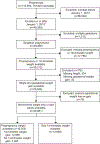Association Between Gestational Weight Gain and Perinatal Outcomes
- PMID: 30204701
- PMCID: PMC6153045
- DOI: 10.1097/AOG.0000000000002854
Association Between Gestational Weight Gain and Perinatal Outcomes
Abstract
Objective: To evaluate the association between gestational weight gain and maternal and neonatal outcomes in a large, geographically diverse cohort.
Methods: Trained chart abstractors at 25 hospitals obtained maternal and neonatal data for all deliveries on randomly selected days over 3 years (2008-2011). Gestational weight gain was derived using weight at delivery minus prepregnancy or first-trimester weight and categorized as below, within, or above the Institute of Medicine (IOM) guidelines in this retrospective cohort study. Maternal (primary or repeat cesarean delivery, third- or fourth-degree lacerations, severe postpartum hemorrhage, hypertensive disease of pregnancy) and neonatal (preterm birth, shoulder dystocia, macrosomia, hypoglycemia) outcomes were compared among women in the gestational weight gain categories in unadjusted and adjusted analyses with odds ratios (ORs) and 95% CI reported. Covariates included age, race-ethnicity, tobacco use, insurance type, parity, prior cesarean delivery, pregestational diabetes, hypertension, and hospital type.
Results: Of the 29,861 women included, 51% and 21% had gestational weight gain above and below the guidelines, respectively. There was an association between gestational weight gain above the IOM guidelines and cesarean delivery in both nulliparous women (adjusted OR 1.44, 95% CI 1.31-1.59) and multiparous women (adjusted OR 1.26, 95% CI 1.13-1.41) and hypertensive diseases of pregnancy in nulliparous and multiparous women combined (adjusted OR 1.84, 95% CI 1.66-2.04). For the neonatal outcomes, gestational weight gain above the IOM guidelines was associated with shoulder dystocia (adjusted OR 1.74, 95% CI 1.41-2.14), macrosomia (adjusted OR 2.66, 95% CI 2.03-3.48), and neonatal hypoglycemia (adjusted OR 1.60, 95% CI 1.16-2.22). Gestational weight gain below the guidelines was associated with spontaneous (adjusted OR 1.50, 95% CI 1.31-1.73) and indicated (adjusted OR 1.34, 95% CI 1.12-1.60) preterm birth.
Conclusion: In a large, diverse cohort with prospectively collected data, gestational weight gain below or above guidelines is associated with a variety of adverse pregnancy outcomes.
Conflict of interest statement
Financial Disclosure
The authors did not report any potential conflicts of interest.
Each author has indicated that he or she has met the journal’s requirements for authorship.
Figures

References
Publication types
MeSH terms
Grants and funding
- U10 HD040500/HD/NICHD NIH HHS/United States
- UG1 HD027869/HD/NICHD NIH HHS/United States
- UG1 HD040560/HD/NICHD NIH HHS/United States
- UG1 HD053097/HD/NICHD NIH HHS/United States
- UG1 HD027915/HD/NICHD NIH HHS/United States
- U10 HD040485/HD/NICHD NIH HHS/United States
- U10 HD034116/HD/NICHD NIH HHS/United States
- U10 HD027869/HD/NICHD NIH HHS/United States
- U10 HD027917/HD/NICHD NIH HHS/United States
- UG1 HD040485/HD/NICHD NIH HHS/United States
- U10 HD040560/HD/NICHD NIH HHS/United States
- K23 HD076010/HD/NICHD NIH HHS/United States
- UG1 HD040500/HD/NICHD NIH HHS/United States
- U10 HD040512/HD/NICHD NIH HHS/United States
- U10 HD040545/HD/NICHD NIH HHS/United States
- U01 HD036801/HD/NICHD NIH HHS/United States
- U10 HD053118/HD/NICHD NIH HHS/United States
- UL1 RR024989/RR/NCRR NIH HHS/United States
- U10 HD040544/HD/NICHD NIH HHS/United States
- UL1 TR002548/TR/NCATS NIH HHS/United States
- UL1 RR025764/RR/NCRR NIH HHS/United States
- UG1 HD034116/HD/NICHD NIH HHS/United States
- UG1 HD040544/HD/NICHD NIH HHS/United States
- UG1 HD034208/HD/NICHD NIH HHS/United States
- UG1 HD040512/HD/NICHD NIH HHS/United States
- U10 HD027915/HD/NICHD NIH HHS/United States
- UG1 HD040545/HD/NICHD NIH HHS/United States
- U10 HD034208/HD/NICHD NIH HHS/United States
- U10 HD053097/HD/NICHD NIH HHS/United States
- P2C HD050924/HD/NICHD NIH HHS/United States
- U10 HD021410/HD/NICHD NIH HHS/United States
- U10 HD036801/HD/NICHD NIH HHS/United States
- U24 HD036801/HD/NICHD NIH HHS/United States
LinkOut - more resources
Full Text Sources
Other Literature Sources

